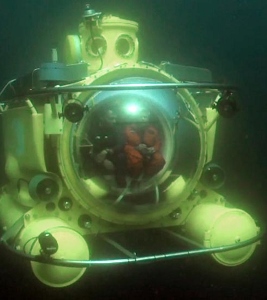Scientists to use submersible to examine lionfish
 (CNS): A group of scientists will engage in a series of dives next week off the Florida coast to study the growing lionfish population in a deep-sea manned submersible. The goal of the three days of diving and panel discussions is to foster long-term collaboration among scientists to halt the unprecedented expansion of this invasive species, the providers of the submersible said in a release. "Our expedition is an opportunity for some of the most respected marine experts in the region to come together and find a way to further science on the lionfish epidemic," said Stockton Rush, the founder and CEO of OceanGate.
(CNS): A group of scientists will engage in a series of dives next week off the Florida coast to study the growing lionfish population in a deep-sea manned submersible. The goal of the three days of diving and panel discussions is to foster long-term collaboration among scientists to halt the unprecedented expansion of this invasive species, the providers of the submersible said in a release. "Our expedition is an opportunity for some of the most respected marine experts in the region to come together and find a way to further science on the lionfish epidemic," said Stockton Rush, the founder and CEO of OceanGate.
"Lionfish are a serious threat to the ecosystems of the Atlantic, Gulf of Mexico and Caribbean waters, and we're pleased to provide our manned submersible for this research initiative and for the collaboration between organizations such as Nova Southeastern University (NSU) and the Florida Fish and Wildlife Conservation Commission, all of which share an interest in raising awareness and exploring methodologies for lionfish population controls."
Antipodes, operated by OceanGate, will utilize a high-powered prototype collection system to catch the fish for later study. The use of OceanGate's submersible creates an unprecedented opportunity for real-time scientific collaboration and observation of lionfish in areas below diver depth. The data collected during the dives will be made available to scientists and researchers across the country.
The recent invasion of lionfish, a non-native predator known for its venomous spines and dramatically increased numbers in the waters of Florida, the Gulf of Mexico and the Caribbean, has severely decreased native fish populations by up to 80%, creating a serious threat to marine and reef ecosystems.
Hosted by Nova Southeastern University (NSU), the mission is also supported by the Guy Harvey Ocean Foundation and will conclude on Saturday, June 29, with a panel of leading experts on aquatic invasive species. Scientists will discuss the data and imagery captured during the expedition, as well as their own first-hand observations.
OceanGate first raised national awareness of the lionfish threat in 2012 during the discovery of a downed World War II Hellcat fighter aircraft. Footage of the wreck also showed an alarming number of lionfish and caught the attention of marine biologists.
"The opportunity to further current research with submersible dives beyond diver depths will offer much needed insight into the species, and bring science closer to a solution for control," states Richard E. Dodge, Ph.D. Dean of NSU's Oceanographic Center.
Category: Science and Nature

